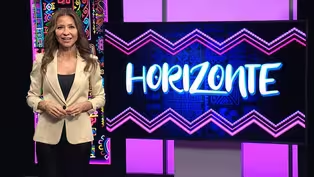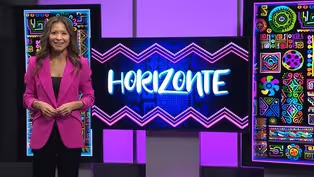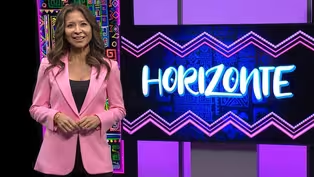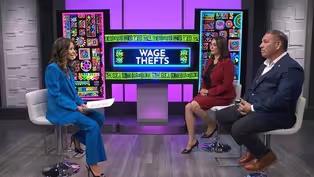
The shortage of Latino doctors in Arizona
Special | 28m 46sVideo has Closed Captions
It's a frustration many Hispanics in Arizona face: Where are the Latino doctors?
We explore the intersection of health care and education and the steps needed to create a stronger, more inclusive medical system. Arizona faces a staggering shortage of Spanish-speaking doctors. "Horizonte" host Catherine Anaya explores the urgent need to diversify the medical workforce through an insightful discussion with a Hispanic doctor and medical student.
Problems playing video? | Closed Captioning Feedback
Problems playing video? | Closed Captioning Feedback
Horizonte is a local public television program presented by Arizona PBS

The shortage of Latino doctors in Arizona
Special | 28m 46sVideo has Closed Captions
We explore the intersection of health care and education and the steps needed to create a stronger, more inclusive medical system. Arizona faces a staggering shortage of Spanish-speaking doctors. "Horizonte" host Catherine Anaya explores the urgent need to diversify the medical workforce through an insightful discussion with a Hispanic doctor and medical student.
Problems playing video? | Closed Captioning Feedback
How to Watch Horizonte
Horizonte is available to stream on pbs.org and the free PBS App, available on iPhone, Apple TV, Android TV, Android smartphones, Amazon Fire TV, Amazon Fire Tablet, Roku, Samsung Smart TV, and Vizio.
Providing Support for PBS.org
Learn Moreabout PBS online sponsorshipMore from This Collection
From health care disparities to the true cost of a car wash, "Horizonte" examines issues of particular interest to Arizona’s Hispanic community. In partnership with WorkingNation and made possible thanks to the generosity of Lumina Foundation, these specials
The Fight for Puerto Rico's Recovery
Video has Closed Captions
Puerto Ricans tackle hurricanes and energy woes with grassroots farming and renewables. (20m 32s)
Food for Thought: Hispanic Roots and the Next Generation's Impact
Video has Closed Captions
Latino street vendors fight the system for independence and to provide for the next generation. (19m 56s)
Gentrification and cultural resilience in Latino communities
Video has Closed Captions
Latinos are confronting an uptick happening in major cities including Phoenix: Gentrification. (16m 17s)
'True Cost of a Car Wash' highlights Latino wage theft and economic equality
Video has Closed Captions
Examine harsh realities of wage theft and labor violations in Arizona for Latino American workers. (28m 46s)
Providing Support for PBS.org
Learn Moreabout PBS online sponsorship(lively music) ♪ Hey, hey, hey ♪ Hey, hey, hey ♪ Hey, hey - Welcome to "Horizonte," a show that takes a look at current issues through a Hispanic lens.
It's no secret that 32% of Hispanic and Latino Americans make up the population in Arizona.
What is a mystery is how many Hispanic doctors are in the state's healthcare system to handle this growing community.
It's a national crisis.
Complicating the drastic shortage of Spanish-speaking doctors are patients struggling to access proper care due to cultural differences, translation issues, and lack of trust in the healthcare system.
Hello, I'm Catherine Anaya, and in this special episode of "Horizonte."
We're featuring a documentary film that explores the issue of healthcare disparities with the Hispanic community.
In the Working Nation film, "Hispanic Doctors Missing From Medicine," we get a glimpse of the personal journey of a young Latina in Houston who makes it her mission to be part of the solution by becoming a doctor.
Through the lens of this documentary, we want to have a conversation examining how to find health equities for Latinos right here in Arizona.
But first, let's get into the film.
(reporter speaking Spanish) (Viviana speaking Spanish) - The Latino population has a lot of very specific healthcare challenges that aren't necessarily felt with other demographics.
For example, Hispanics in the state of Texas are more than twice as likely to be obese than non-Hispanic white children.
50% of Latino children will develop diabetes in their lifetime.
Houston is where the United States is going to be within the next few decades.
(speaking Spanish) (speaking Spanish) (speaking Spanish) [Christopher] As the fastest growing population in the United States, we will need Latinos to be able to fill doctor roles and healthcare professional roles, just naturally with the way that our demographics are changing in the United States.
(speaking Spanish) (speaking Spanish) (soft music) (speaking Spanish) (speaking Spanish) (speaking Spanish) - There is a correlation that if you have a Latino doctor, that they're gonna take care of Latino patients better.
It is very important that we do have Latino doctors treating Latino patients because of the implicit bias that exists in society.
- It's real easy to say, you know, that "Your weight is up, you know, you need to lose weight, you need to take your pills."
And I said, "Have you ever sat in the shoes of some particularly Latinos?"
You're up at six o'clock.
Well, you're at work at six o'clock and you work all day.
Manual labor, it's hot, and you get whatever food is there.
(speaking Spanish) - I've always loved to learn, I always valued education.
It's been important to me since I was a little girl.
My parents were born in Zinaparo, Michoacan in Mexico and my dad started working in the fields in like then Arizona.
Well, I think for myself, I never imagined that I can be a doctor.
I didn't see doctors around me.
And growing up in East Oakland, California, it's a very rough neighborhood, a lot of violence and poverty there.
Thinking about like, "Oh, I want to be a doctor," it doesn't really, it's hard for it to happen in places like that.
- Thank you for joining us for this special episode of "Horizonte," and the presentation of the short film, "Hispanic Doctors Missing From Medicine."
We'll get back to the film shortly.
We saw that Vilma's brother's illness and how she had to translate for her parents at such a young age fueled her quest to get into medicine.
Rebeca Soto Caballero, who is a medical student, and with the Latino Medical Student Association, understands Vilma's journey.
Also, joining me for this conversation is Dr. Jesse Bracamonte, who practices family medicine at the Mayo Clinic Arizona.
Doctor, you are very passionate about the need for more Latino and bilingual physicians.
How dire would you say the situation is here in Phoenix and Arizona?
- It's quite dire, there's definitely a need.
There's a lack of Hispanic physicians to keep up with the growing community.
A lack of Hispanic physicians just allows for poor outcomes, there's not enough care to provide to the special community that desires preventative healthcare needs and with a multicultural competent care.
- And how would you describe the trickle down effect on Arizona when it comes to the economy and the workforce when you don't have enough of these Latino and bilingual physicians?
- That's a great question.
There's significant trickle down effect.
So with individuals that don't get the care they need from lack of trust in the system, not having adequate, competent healthcare physicians that can represent and treat those individuals, there's just a lack of entry into the system.
Therefore, there's higher intensity of chronic illness, lack of productivity, and then actually down cost revenue streams and healthcare burdens on the healthcare system overall.
- Well, and you had also mentioned to me previously that it can lead to absenteeism too with children.
- Yeah, absolutely.
It's a whole trickle down with the family, preventive healthcare costs go up, lack of work, absenteeism with work, and productivity all goes up.
And even, in some instance, some cancers can go up just because of lack of preventative healthcare access and screenings drop.
- Rebeca, what's your experience?
I know that you're a student right now, but you've been in the healthcare industry as a student for long enough that I'm sure you have some impressions of this subject.
- Yes, of course.
So currently, I'm a second year medical student cited in Tucson.
So I've had some rotations where I could see a little bit more of what we're talking about in this topic.
From my experience, even in my preceptors who are my teachers and guiding me through my journey as a second year, I can tell you that out of the 10 of them, only three of them are of Hispanic descent.
- [Catherine] Wow.
- And just to give a little insight more into my class, out of the 90 students, there's only less than handful of us that are of Hispanic descent.
So there's definitely a discrepancy in those numbers that we can take into account for sure.
- Absolutely.
A serious discrepancy, as you mentioned, Doctor, talk to me a little bit about the healthcare challenges this kind of discrepancy poses for Latino families and communities in Arizona.
- Yeah, so studies have all been documented for decades that those that are of a special culture or that the culture are more likely to seek care from that individual that shares the same cultural beliefs and ethnicity.
So when you have that cultural connection, you're more likely to receive the care you need, there's more instance of trust in the system and there's more likely to adherence of the prescription plan rendered and there's more access to preventive care services.
When you have all that, that just provides good care.
Lack of such provides inadequacies and lack of that opportunity to provide care to those needed populations.
- And I know Rebeca is shaking her head because you have experience having served as a translator for your parents when it comes to healthcare.
How did that experience influence your decision to then pursue a career in medicine?
- Yeah, thank you so much for that question.
As far as I can remember, I've always been my parents' personal translator.
And I remember just having little anecdotes with my mom that she would fear not having me around her because of fear of misinterpretation or fear of embarrassing herself because of her accent or mispronunciation.
And overall, just the limit of resources that you get because you can't communicate what you're trying to say.
So, for sure, that's something that I, like, hold very dear in my heart.
And the reason why I want more interaction with the Hispanic community, specifically helping patients with the access of healthcare, for sure.
- Well, speaking of patients, Doctor, I mean, how difficult is it for patients to find a Latino doctor in their community?
- It's overall very difficult.
I think for some of us it's just difficult to finding primary care in general or finding a physician.
But yet lack of finding a Hispanic physician can be difficult.
They may find they may be just entrusted to what their insurance deems appropriate or what's in their care network.
So it is difficult.
It's even more difficult to ensure that that physician speaks Spanish or at least has the cultural competencies and knows that that background is there so I can have that connection so I can receive the care that they need.
- There are so many implications when it comes to this shortage of Hispanic doctors and Hispanic students, they face systemic barriers while pursuing their medical education.
As we return to "Hispanic Doctors Missing From Medicine," the film explores different programs, bridging the gap in getting more students into medical school and becoming future physicians.
- The medical schools don't have the amount of scholarships and the endowments for people to go in.
And so that's one.
Many Latino students don't want to put themselves in debt for that amount of money, don't qualify for those loans.
And, frankly, many of them are discouraged when they go to undergraduate to be able to get a pre-med degree because many people will tell them, "You're not gonna be able to afford to go to medical school."
- The cost, I think, is a big barrier for Latinos to pursue medicine.
Medical school is extremely expensive.
I think the average debt is 200, 250,000, I'm not really exactly sure, but it's a lot.
My parents haven't paid for anything since I left high school in terms of my school or anything like that.
So I kind of found my own way.
And so, they don't know how much it costs, but I'm in a lot of debt.
I think that it took me a little longer to get into medical school because I was trying to work and do classes and volunteer and do the research and all of these things at the same time, because I didn't want to stop working to focus on school.
It was a very scary step.
I don't know how to describe it, it's a lot of pressure.
- Medical school is a very long process and that can be very expensive, considered our healthcare education was really not built around a consideration of having a Latino population or a Latino student body.
So mostly, of course, designed for those that are English speakers from the United States.
If you have a family that doesn't have access to a lot of resources and that can indeed create a huge barrier for kids to make a decision to go to medical school.
(speaking Spanish) (conversing in Spanish) (speaking Spanish) - I didn't really have mentors in my life kind of asking me, "What are you gonna do with your life?"
Or trying to guide me on that path.
So I felt like by the end of college, I was a bit lost.
When I was applying to medical school, I met MiMentor, which is a national mentoring organization.
The program is kind of run and led by doctors who have a similar story to me.
They're first generation, nobody helped them, so they struggled.
Once I connected with them and I started the medical school readiness program, it just made such a difference.
I applied to medical school twice.
So the first time I didn't get in, but the second time I got in.
And I think MiMentor had a lot to do with that.
Having mentors that help us and then turning around and helping other people, it will create a ripple effect.
But I don't think we'll be able to see it for a few decades, I think.
(speaking Spanish) - It's a complete market failure in terms of healthcare.
- You have to make sure policies change and systems change and communities change.
And all of that doesn't happen overnight.
I'm hopeful that it's heading in the right direction, but I think we're slowly gonna get there with more Latino doctors, it'll take time.
Two weeks ago I started residency here at Baylor and it's been great.
It's been fantastic.
(speaking Spanish) (speaking Spanish) - I love you.
- I love you, Mommy.
(conversing in Spanish) - This film is so compelling.
And Doctor, I want to talk to you a little bit about your passion for medical education.
Do you think that Arizona's medical schools are doing enough to recruit and retain Hispanic physicians?
- Well, I think our med schools are definitely made progress.
Can we do more?
Absolutely.
I think our numbers reflect that.
There just aren't enough Latino physicians or graduating from med school or even qualified applicants going into med school to select from the whole applicant pool.
We can do more.
I think we're giving ourselves maximum effort, but we have to up the ante on that.
I think extending programs to have qualified applicants apply to med school will be our future workforce to keep up with the population.
- Rebeca, I wanna get your thoughts on this, and particularly because you are a student in medical school, are doctors and students getting enough language training when it comes to being able to speak Spanish with patients?
- Of course, yes.
So after talking to some colleagues of mine during medical school, I can tell you that there should be more done in regards to providing more official language training.
I can tell you a little bit about, now that I'm in my Tucson Community Health site, that we have the opportunity to do an elective for our third year rotation, and it's called Medical Spanish.
But it is an elective and it's not required, so you would have to seek out for it.
So again, I think that if it were more encouraged or even a requirement, that it would be better to promote more of that language awareness.
- Yes, and very critical, right, Doctor?
- Yeah, it is, especially in Arizona where many individuals and patients are not, or speak limited English.
So like we all, we all know that with that English to Spanish translation or just speaking the language, you have better access, and you have better health outcomes, I should say.
So it's crucial.
I think having those programs available, at least making an opportunity for all schools to have that is a big first step.
- Going back to the education for just a moment, Rebeca, you're a member of the Latino Medical Student Association.
How critical is that organization to you and others who are med students and who are interested in, you know, becoming more vested in the number of Hispanic and Latino doctors in Arizona?
- Yeah, of course.
So I can briefly mention my experience and journey as a pre-med in undergrad, I didn't have a community of like-minded individuals who were interested in medicine and also Hispanic.
So it was something that I was really looking forward to finding in medical school.
And fortunately I did with LMSA, which we call, overall, LMSA is an organization nationwide, there's many chapters and our chapter specifically is focusing over these couple past years to mentor pre-med students and helping guide them and provide them resources.
And overall just providing a networkship and also just encouraging them to embrace our culture and spread it and also just be another person to resonate with our patients in the medical field.
- So mentorship is critical to your success?
- Yes, for sure.
- And you would agree with this, Doctor?
Because as I mentioned, you are very passionate about medical education.
I wanna get your thoughts on this topic, but particularly when it comes to first-generation students, medical students of Latino descent, you were one of them.
- I was.
- Can you tell me about that?
- Yeah, I was, it's very dear to my heart and passionate about it, 'cause I had somebody encourage me and being a youngster and just having somebody encourage me and kind of show me the steps early on and show me that this is doable and to kind of tell me and give me the opportunity to ask those questions was key, whereas if I didn't know or have that individual, maybe I wouldn't have been here today, you know?
So I think early mentorship is key, not just in the undergrad, but even in the high school areas and getting those programs out there 'cause so many people have lack of resources or the ability to have those individuals that have sought higher education or have that ability.
Many of my family members have not sought secondary education 'cause they weren't before those opportunities.
So that's key.
Fortunately, I had parents that really allowed me to do that and provided the mentorship with other individuals and connecting with people that could get me to that point.
So overall, mentorship programs I think are key in the future for achieving these numbers.
- And when we're talking about achieving these numbers, I mean, how important is it for these med schools to reach students at a younger age?
I mean, when is the appropriate time?
- Well, I think it's critical.
I think there's many programs out there that will go out and reach to undergrad, even some high school programs, and there's even elementary outreach programs that I have, but our school supports and has our med students go out and reach to these elementary school kids to have to show 'em what healthcare is and show 'em that this is what the heart does, this is what the lungs do.
To have that early mentorship opportunity to get the kids interested in medicine.
That's number one.
So those programs are out there, should we do more?
Absolutely, we can do more.
I think the numbers clearly state that.
- Would you agree with that, Rebeca?
- Of course, yeah, 1,000%.
- Okay, thank you both.
Appreciate it so much.
- Thank you, it's my pleasure.
- We do wanna, once again, thank our guests, Dr. Jesse Bracamonte and Rebeca Soto Caballero for this very important discussion.
This crisis is not going to be solved overnight because it does require systemic change and recruiting more medical students at a younger age, finding Spanish-speaking doctors who want to work in Arizona, and understanding the needs of Latino patients across the state.
But we will continue having conversations like these because they're important and they matter to you.
I'm Catherine Anaya, thank you for watching this special episode of "Horizonte."
(lively music) (singer speaking Spanish) (singer singing in Spanish)

- News and Public Affairs

Top journalists deliver compelling original analysis of the hour's headlines.

- News and Public Affairs

FRONTLINE is investigative journalism that questions, explains and changes our world.












Support for PBS provided by:
Horizonte is a local public television program presented by Arizona PBS



